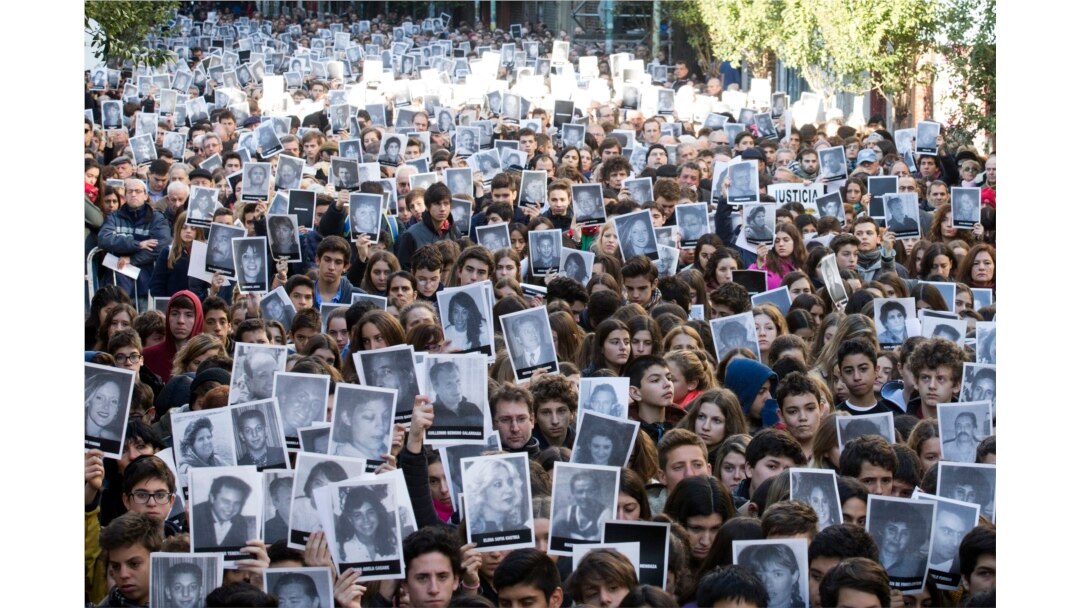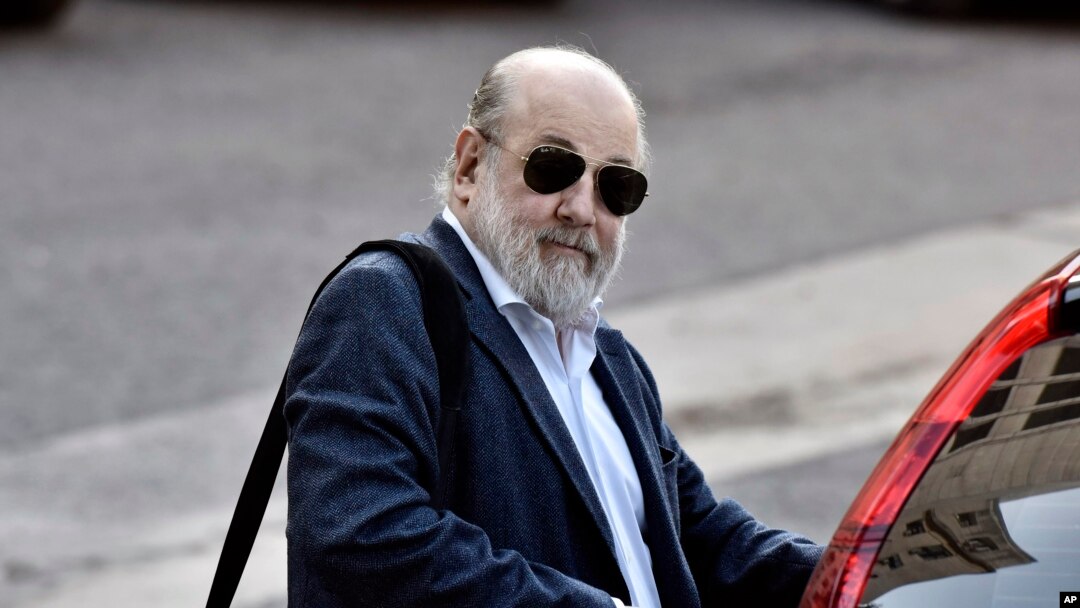Argentinian judicial authorities seeking to prosecute officials suspected of covering up Iran’s alleged role in a 1994 Buenos Aires terrorist attack have suffered another setback with the death of a judge who led the legal battle against those officials.
Judge Claudio Bonadio, head of Argentina’s No.11 Federal Criminal and Correctional Court, died Tuesday at the age of 64, after undergoing surgery for a brain tumor last year.
Bonadio had spent years building a case against Argentinian officials who approved a controversial 2013 memorandum of understanding (MOU) with Iran. He had gathered evidence alleging the MOU was part of an illicit deal for Buenos Aires to shield Iranian suspects in the 1994 attack from justice in return for securing oil and other economic benefits from Tehran.

FILE - People hold up pictures of the victims of the 1994 bombing of the AMIA Jewish community center on the 21st anniversary of the terror attack in Buenos Aires, Argentina, July 17, 2015.
The July 18, 1994, suicide car bombing of the Argentine Israelite Mutual Association Jewish community center in the Argentine capital killed 85 people. It remains Latin America’s deadliest terrorist attack.
In the following years, Argentinian judicial authorities accused Lebanese militant group Hezbollah of carrying out the attack on the order of Iranian officials. Iran and Hezbollah have denied involvement and refused to send any suspects named by Argentina to stand trial there.
Bonadio had taken up the investigation of the Argentinian officials who approved the MOU with Iran after an earlier setback in the case: the January 2015 death of prosecutor Alberto Nisman.
Nisman had initiated the investigation of the MOU approved by then-Argentinian President Cristina Fernández de Kirchner, and was hours away from presenting his evidence of a cover-up to the Argentinian Congress when he was found dead in his home of a gunshot to the head. Kirchner said he committed suicide, but a 2017 report by the Argentine National Gendarmerie, a domestic security force, said he had been murdered. Nisman’s death remains an unresolved legal matter in Argentina.
Kirchner, who served two terms as president from 2007 to 2015, returned to high office as Argentinian vice president in December, winning election as the running mate of President Alberto Fernández (no relation) after she served two years as a senator.
FILE - Argentine prosecutor Alberto Nisman speaks with journalists in Buenos Aires, Argentina, May 29, 2013. Picture taken May 29, 2013. Nisman was found dead hours before presenting evidence of a cover-up in the 1994 AMIA bombing.
The 2013 MOU with Iran had called for a bilateral commission to conduct a new joint investigation of the AMIA bombing, years after Argentinian judicial authorities had issued arrest warrants and secured Interpol red notices asking for international help in detaining and extraditing the Hezbollah militants and Iranian officials wanted in connection with the attack.
Argentinian critics of the MOU, incensed by Nisman’s allegations that it was part of a cover-up, succeeded in getting a court to rule it unconstitutional in 2015 and it was never implemented.
Bonadio, who continued Nisman’s work on the MOU case after the prosecutor’s death, had charged Kirchner and her aides with treason and obstruction of justice in 2017. He also had been pursuing multiple corruption cases against the former president in recent years in relation to her presidential tenure.
Kirchner consistently has denied wrongdoing and accused the judge of waging a personal vendetta against her.
Bonadio had last worked Dec. 30, after which he had taken vacation in January, his secretary Mónica Mica told VOA by phone. Sometime before Dec. 30, he had handed the central part of the MOU case to the No. 8 Criminal Federal Tribunal, judicial official Rodriguez Varela confirmed, also in a VOA phone interview. The tribunal is a body that decides, after analyzing the investigating judge’s evidence, whether to hold a trial and issue a verdict.
However, a legal dispute about witness testimony in the MOU case continued into last month, according to Argentinian news site Infobae, indicating that there was more work for Bonadio to do.
Judge Sebastián Casanello, who works in the No. 7 Federal Criminal and Correctional Court, has been temporarily assigned to handle Bonadio’s cases, his secretary told VOA in a Friday phone call. The secretary said Casanello began working on those cases Wednesday, the day after Bonadio died.
“It’s unclear if Casanello or Bonadio’s eventual permanent replacement will bring the profound commitment to the case that Bonadio brought, given the renewed influence of Kirchner as vice president,” said Toby Dershowitz, senior vice president for government relations and strategy at the Washington-based Foundation for Defense of Democracies, in a message to VOA Persian.
Kirchner’s lawyer Gregorio Dalbón, speaking to VOA in a Thursday phone interview, said Bonadio had failed to present any direct evidence of a crime by his client.
“The MOU case either will be shelved or she will be exonerated in that and all the other cases because they are part of a ‘lawfare’ campaign (misuse of legal systems and principles against an enemy). Bonadio spent his years as a judge pursuing politics not justice,” Dalbón said.
A tribunal spokesman reached by phone Friday would not say whether it has decided to hold a trial or when such a decision will be made, but he said shelving the case was unlikely.
FILE - Argentina's new President Alberto Fernandez and Vice President Cristina Fernandez de Kirchner smile after they take the oath of office at the Congress in Buenos Aires, Argentina, Dec. 10, 2019.
Bonadio’s death also could embolden plans by Kirchner and President Fernández to reform the computerized lottery system that assigns judges to cases involving political figures.
“We were suspicious and wondered why all the cases involving Kirchner ended up in Bonadio’s hands,” Dalbón said. “We believe the process of assigning a case to a judge should be public and transparent. This will be one of the reforms of President Fernández.”
Benjamin Gedan, director of the Argentina Project at Washington’s Wilson Center, told VOA Persian the Argentinian judiciary has had long-running problems with political interference and corruption under governments of all political parties.
“I think efforts to reform the judiciary are necessary,” Gedan said. “But it’s hard not to think that the motivation is to guarantee impunity for members of the Kirchner/Fernández administration.”
It is not clear what impact the judge’s death will have on the new Argentinian government’s approach to bringing the Iranian and Hezbollah suspects in the AMIA bombing to trial.
FILE - Argentina's President Mauricio Macri and his wife, Juliana Awada, react during a rally in support of Macri, in Buenos Aires, Argentina, Dec. 7, 2019. He lost to opposition candidate Alberto Fernandez.
The prior administration of Mauricio Macri, who served as president from 2015 to 2019, had called on Iran to cooperate with Argentina on the issue and had appealed to other countries to detain any suspects who entered their territories.
“The new government is seeking to reverse each and every positive step that has been taken to bring a measure of justice to the victims of the AMIA bombing and their families. It would be a travesty of justice for Argentina if these efforts were to succeed,” FDD’s Dershowitz said.
“Personally, I am skeptical about the AMIA case,” Dalbón said. “Cases that last longer that 20 years very rarely can reach the truth. Slow justice is not justice.”
This article originated in VOA’s Persian Service. It was produced in collaboration with VOA’s Latin America Division.


